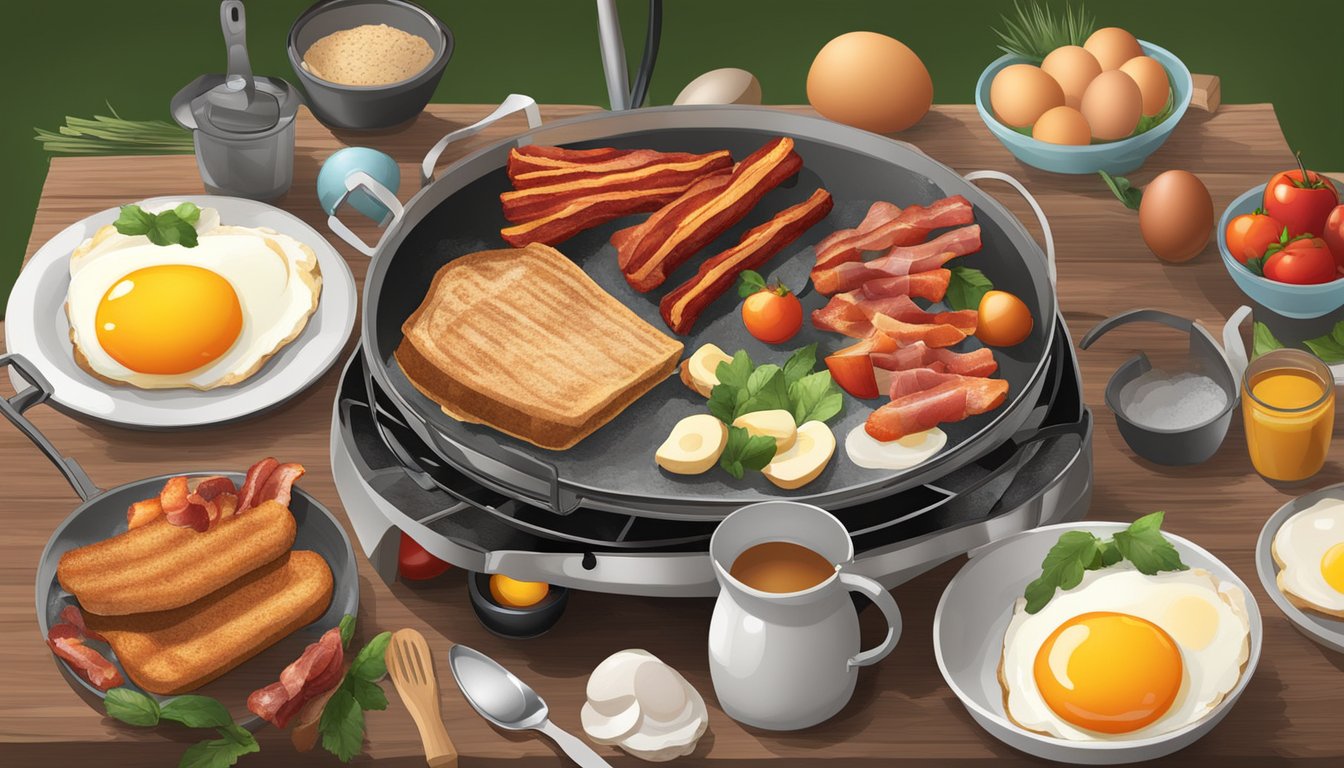Camping offers a unique opportunity to connect with nature and enjoy the great outdoors. While many aspects of camping can be enjoyable, starting the day with a delicious breakfast sets the tone for adventure. Creative and satisfying camp breakfast ideas can elevate the entire camping experience.
From quick and easy options to more elaborate outdoor cooking adventures, there are numerous breakfast possibilities for campers. These meals can provide the energy needed for hiking, fishing, or simply relaxing by the campfire. With some planning and preparation, campers can enjoy tasty and nutritious breakfasts that rival those made in a fully equipped kitchen.
1) Pancake Mix in a Shaker Bottle
Pancake mix in a shaker bottle is a convenient and mess-free solution for camp breakfasts. Campers can prepare the dry ingredients at home and store them in a sturdy, sealable bottle.
The basic mix typically includes flour, baking powder, salt, and powdered milk. Some recipes add sugar or spices for extra flavor. When it’s time to cook, simply add water to the bottle and shake vigorously.
This method eliminates the need for measuring tools and mixing bowls at the campsite. It also reduces cleanup time, allowing campers to enjoy their outdoor experience fully.
For added convenience, pre-divide larger batches into individual servings before the trip. This ensures each camper gets the right amount of pancake mix without waste.
Many outdoor enthusiasts use sport bottles or dedicated pancake shakers for this purpose. These containers are durable and leak-proof, making them ideal for camping trips.
Some campers enhance their pancakes with add-ins like dried fruit, nuts, or chocolate chips. These can be mixed into the dry ingredients or sprinkled on top during cooking.
2) Overnight Oats with Dried Fruits
Overnight oats offer a convenient and delicious camping breakfast option. By preparing them the night before, campers can enjoy a hassle-free morning meal without cooking.
The base of overnight oats typically consists of rolled oats, milk or a plant-based alternative, and yogurt. These ingredients are combined and left to soak overnight, resulting in a creamy and satisfying texture.
Adding dried fruits to overnight oats enhances both flavor and nutrition. Popular choices include raisins, cranberries, apricots, and dates. These fruits provide natural sweetness and a chewy texture to contrast with the soft oats.
Dried fruits are particularly well-suited for camping trips due to their long shelf life and portability. They require no refrigeration and can withstand various weather conditions, making them ideal for outdoor adventures.
To prepare overnight oats with dried fruits at camp, simply mix the ingredients in a container with a tight-fitting lid. Store it in a cool place overnight, and enjoy a ready-to-eat breakfast in the morning.
For added variety, campers can include nuts, seeds, or a drizzle of honey to complement the dried fruits. This versatile dish allows for customization based on individual preferences and available ingredients.
3) Breakfast Burrito Wraps
Breakfast burrito wraps are a popular and convenient camping meal option. They can be prepared in advance, frozen, and easily reheated at the campsite.
To make camping breakfast burritos, start by cooking ingredients like scrambled eggs, sausage, or chorizo. Add cheese, vegetables, and other fillings of choice to the tortillas.
Roll the burritos tightly and wrap them individually in aluminum foil. This helps preserve freshness and makes reheating easier.
Store the wrapped burritos in freezer bags and keep them frozen until ready to use. When camping, simply place the foil-wrapped burritos near the campfire to warm them up.
For a quick morning meal, campers can enjoy these pre-made burritos with minimal preparation. They provide a hearty, satisfying breakfast to fuel outdoor activities.
Breakfast burrito wraps offer versatility in ingredients and flavors. Options include combinations like chorizo with red peppers and Monterey Jack cheese, or classic sausage and egg varieties.
4) Pre-cooked Bacon Strips

Pre-cooked bacon strips are a convenient option for campers looking to simplify their breakfast routine. These ready-to-eat strips eliminate the need for cooking raw bacon over a campfire, saving time and effort during meal preparation.
Campers can easily incorporate pre-cooked bacon into various breakfast dishes. They make excellent additions to sandwiches, wraps, or breakfast burritos. The strips can be quickly reheated in a pan or even enjoyed cold if preferred.
Pre-cooked bacon is also a versatile ingredient for other camping meals. It can be crumbled and added to scrambled eggs, mixed into hash browns, or used as a topping for pancakes or waffles.
When packing pre-cooked bacon for a camping trip, it’s important to store it properly. Keep the strips in a sealed container or resealable plastic bag in a cooler to maintain freshness and prevent spoilage.
For those concerned about nutrition, pre-cooked bacon often contains less fat than its raw counterpart. This can be beneficial for campers looking to enjoy bacon flavor without excessive grease.
5) Granola Bars

Granola bars are a popular and convenient breakfast option for campers. These portable snacks provide a quick energy boost to start the day off right.
Store-bought varieties offer ease and variety, but homemade versions allow for customization and control over ingredients. Campers can make their own bars before the trip, tailoring them to their tastes and dietary needs.
Common ingredients include oats, nuts, dried fruits, and honey or syrup as a binder. Some recipes incorporate chocolate chips, coconut, or seeds for added flavor and nutrition.
No-bake granola bars are particularly suited for camping. These require no cooking and can be prepared in advance, saving time and effort at the campsite.
Granola bars are not only ideal for breakfast but also serve as a handy snack during hikes or other outdoor activities. Their compact size makes them easy to pack and carry.
For those seeking alternatives, quinoa flakes or puffed rice can replace traditional oats, offering different textures and nutritional profiles. These variations can cater to gluten-free or other specific dietary requirements.
6) Instant Oatmeal Packets
Instant oatmeal packets offer a quick and convenient breakfast option for campers. These lightweight packets are easy to pack and require minimal preparation at the campsite.
Many campers opt to create their own custom oatmeal blends at home. This allows for control over ingredients and flavors while avoiding excess sugar found in store-bought varieties.
To make homemade instant oatmeal packets, start with a base of quick oats. Add dried fruits, nuts, seeds, and spices to create unique flavor combinations. Portion the mixtures into individual zip-top bags for easy transport.
At camp, simply pour the contents of a packet into a bowl or cup. Add hot water, stir, and let sit for a few minutes until the oats soften. The amount of water can be adjusted to achieve the desired consistency.
For added nutritional value and taste, consider including ingredients like chia seeds, flaxseed, or coconut oil in the packets. These add healthy fats and extra calories, which are beneficial for active campers.
Instant oatmeal packets pair well with other camp breakfast staples like fresh fruit, granola, or a hot beverage. They provide a warm, filling meal to start the day’s outdoor adventures.
7) Dehydrated Breakfast Skillet
Dehydrated breakfast skillets offer a convenient and lightweight option for campers seeking a hearty morning meal. These easy-to-prepare dishes combine various dehydrated ingredients that reconstitute quickly with hot water.
A typical dehydrated breakfast skillet might include a mix of freeze-dried eggs, dehydrated potatoes, and assorted vegetables like peppers, onions, and mushrooms. Some recipes incorporate dehydrated meats such as bacon or sausage for added protein.
Preparation is straightforward. Campers simply add hot water to the dehydrated mixture in a pot or skillet, allowing the ingredients to rehydrate. Cooking time is minimal, usually around 15-20 minutes.
For additional flavor, campers can include dehydrated salsa, spices, or powdered cheese in their breakfast skillet mix. These ingredients enhance taste without adding significant weight to the pack.
Dehydrated breakfast skillets are ideal for backpackers, boondockers, and those camping off-grid. They provide a nutritious, filling meal without the need for refrigeration or bulky fresh ingredients.
8) Yogurt and Nut Granola

Yogurt and nut granola is a classic camping breakfast that combines convenience and nutrition. This no-cook option is perfect for campers who want a quick and satisfying meal to start their day.
Campers can pack their favorite yogurt in a cooler bag to keep it fresh. Greek yogurt is an excellent choice due to its high protein content, which helps fuel outdoor activities.
The granola component adds a delightful crunch and extra nutrients. A mix of nuts, seeds, and oats provides essential fats, fiber, and carbohydrates. Campers can prepare their own granola mix at home or purchase a pre-made version.
Fresh or dried fruits make excellent additions to this breakfast. Berries, sliced bananas, or chopped apples can add natural sweetness and extra vitamins.
This versatile breakfast allows for customization based on individual preferences. Campers can adjust the yogurt-to-granola ratio or experiment with different flavor combinations to keep things interesting throughout their trip.
9) Campfire French Toast
Campfire French toast transforms a classic breakfast into an outdoor adventure. This delicious dish can be prepared over an open flame, making it perfect for camping trips.
To make campfire French toast, start by mixing eggs, milk, sugar, and vanilla extract in a bowl. Dip slices of bread into the mixture, coating both sides evenly.
Cook the soaked bread on a cast iron griddle or skillet placed over the campfire. The heat from the flames will create a golden, crispy exterior while keeping the inside soft and custardy.
For a convenient alternative, try the foil packet method. Assemble the French toast in aluminum foil packets and place them directly on the hot coals. This approach allows for easy cooking and cleanup.
Top your campfire French toast with fresh berries, maple syrup, or a dusting of powdered sugar. The combination of smoky flavors from the fire and sweet toppings creates a unique and satisfying breakfast experience.
Campfire French toast is an excellent option for feeding a group, as it can be prepared in larger quantities than traditional pan-fried methods. It’s sure to become a favorite on your camping menu.
10) Peanut Butter and Banana Sandwiches
Peanut butter and banana sandwiches are a classic no-cook camping breakfast option. They provide a perfect balance of carbohydrates, protein, and healthy fats to fuel outdoor adventures.
To prepare this simple meal, campers need just a few ingredients: bread, peanut butter, and bananas. Whole wheat bread or tortillas make excellent bases for the sandwich, offering added fiber and nutrients.
Spread a generous layer of peanut butter on one or both slices of bread. Slice a ripe banana and arrange the pieces evenly across the peanut butter. For added flavor, a sprinkle of cinnamon can complement the sweetness of the banana.
This versatile sandwich can be customized to suit individual preferences. Some campers may opt to add honey for extra sweetness, while others might include a handful of granola for additional crunch and texture.
Peanut butter and banana sandwiches are not only easy to make but also portable. They can be prepared in advance and wrapped securely for a quick grab-and-go breakfast on busy mornings at the campsite.
Nutritional Considerations

Proper nutrition is crucial for camping trips, providing energy for outdoor activities and maintaining health. A balanced breakfast sets the tone for the day, fueling adventures and supporting overall wellbeing.
Balancing Protein and Carbs
A nutritious camp breakfast should include a mix of protein and carbohydrates. Protein helps build and repair muscles, while carbs provide quick energy. Eggs, lean meats, and nuts are excellent protein sources. Whole grain breads, oatmeal, and fruits offer complex carbohydrates.
Aim for a 1:2 ratio of protein to carbs. For example, pair two eggs with a slice of whole grain toast and an apple. This balance helps maintain steady blood sugar levels and provides sustained energy for hiking or other activities.
Consider portable protein options like hard-boiled eggs, jerky, or protein bars for convenience. Combine these with fruit or granola for a quick, balanced meal.
Including Fresh Ingredients
Fresh ingredients elevate camp breakfasts nutritionally and flavor-wise. Pack sturdy fruits like apples, oranges, and berries. These provide essential vitamins, minerals, and fiber. Vegetables like bell peppers and cherry tomatoes add nutrients and color to breakfast scrambles.
Use a cooler to bring perishables like yogurt, milk, and cheese. These offer calcium and additional protein. Fresh herbs like basil or chives can enhance flavor without adding calories.
Consider pre-chopping vegetables at home for easy morning prep. Vacuum-sealed or canned fruits serve as alternatives when fresh options aren’t feasible. Remember to practice proper food safety, keeping perishables cold and consuming them early in the trip.
Cooking Tips and Techniques
Mastering camping cooking techniques and efficient meal prep strategies can elevate your outdoor dining experience. These skills allow campers to prepare delicious breakfasts with minimal fuss and maximum enjoyment in nature.
Efficient Use of Camping Stoves
Camping stoves provide a reliable heat source for outdoor cooking. Choose a stove appropriate for your group size and trip duration. Two-burner propane stoves offer versatility for most car camping situations.
Prioritize safety by setting up the stove on a flat, stable surface away from flammable materials. Use a windscreen to improve fuel efficiency and cooking speed. Preheat pans before adding ingredients to ensure even cooking.
For precise temperature control, adjust the flame as needed. Simmer delicate items on low heat, and use high heat for boiling water quickly. Clean the stove after each use to prevent food buildup and maintain performance.
Meal Prepping Strategies
Effective meal prep simplifies camp cooking and minimizes cleanup. Pack ingredients in reusable containers or zip-top bags, organizing them by meal. Pre-measure dry ingredients and spices at home to save time and reduce waste at the campsite.
Prep vegetables in advance by washing, cutting, and storing them in sealed containers. For eggs, crack them into a leak-proof container for easy transport and quick cooking. Freeze meat or perishables to keep them fresh longer and act as ice packs in your cooler.
Consider one-pan meals to streamline cooking and cleanup. Foil packet recipes are ideal for easy prep and minimal dishes. Plan no-cook breakfast options like overnight oats for effortless mornings in camp.




